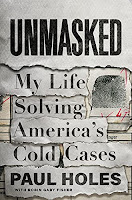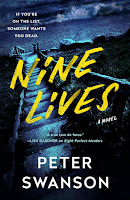I'm a crime fiction junkie. Give me a book that has murder, corruption, or some kind of investigation, and I'm in. It has been an obsession of mine for as long as I can remember. Even as a child I would spend hours rereading my copies of the Encyclopedia Brown mysteries. Today I read as many popular thrillers as I possibly can. There's an odd sense of comfort that I get from reading these books, a strange juxtaposition to the darkness that the pages typically contain. I first became familiar with Paul Holes from his involvement in hunting the Golden State Killer. He was a pivotal partner to the late author Michelle McNamara whose investigation into the serial killer helped renew the quest in finding him. I was less familiar with his career outside of that single case. When the publisher offered me a copy of Unmasked, a new memoir by Paul Holes, I eagerly accepted the opportunity to learn more about his storied career.
Who is Paul Holes? Unless you pay close attention to the people who investigate horrendous crimes, you've probably never heard of him. Even I was only tangentially aware of him through the works of other investigators. Though you may have never heard of Paul Holes before reading this review, I can almost guarantee that you've heard of some of the high-profile cases that he's been involved with. Yes, he's credited with helping to identify the Golden State Killer, but he was also involved in other notable cases like the murder of Laci Peterson and the kidnapping of Jaycee Dugard. It is wild to think that one man could have been part of solving so many infamous crimes.
Holes writes of his beginnings as little more than a glorified lab rat working in the county crime lab. His enthusiasm for science combined with an obsessive desire to solve unsolvable crimes. As he mastered the skills needed to become a CSI during his work hours, Holes would spend his off time sifting through the countless cold case files in the office basement. He was compelled to use the advances of modern science, such as DNA, to bring closure to the decades-old investigations. As his mastery of criminal investigation grew, so did the profile of the crimes he was tasked with solving. Hole writes of the precarious balancing act of juggling horrific crimes, a desire to devote time and resources to older investigations, and trying to be present for his young family.
The title Unmasked describes this work on multiple levels. Paul Holes dedicated his life to unmasking the worst criminals imaginable. He built a career chasing that revelation for each crime he investigated. As Holes uncovered the evidence, he also began to unmask the victim. The unbridled respect for the humanity of the lives lost in each case shines through every retelling of an investigation. I got the sense that Holes was driven by not only his curiosity but by a need to understand and provide closure to the victims. As he chronicles the highlights of his career through some of the most compelling true crime writing I've ever read, Paul Holes also reveals the deepest part of himself, ultimately unmasking the man behind each of these investigations. He's far from perfect. In fact, his compulsive desire to find the truth saw him face deeply personal hardships. Broken relationships, professional missteps, and an unhealthy dependence on bourbon to ease stress were all side effects of his lifestyle. Unmasked succeeds as a fascinating inside look at the mechanisms of solving a crime, and as a memoir of one man who has dedicated his entire life to seeking justice.
For more information visit Amazon and Goodreads.
(2022, 17)







